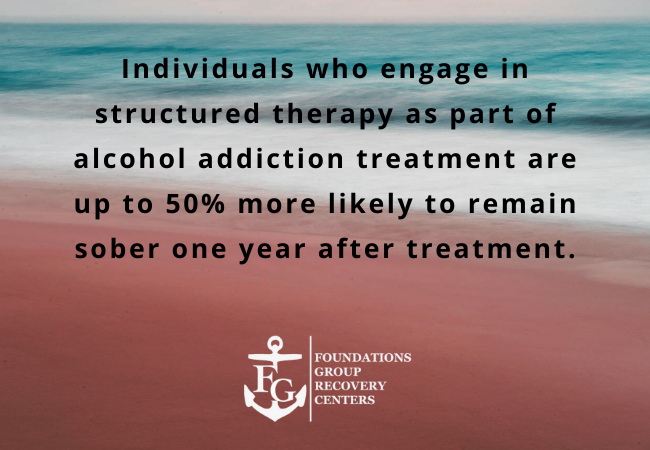Recovering from alcohol addiction is a profound and deeply personal journey. While detoxification may address the physical dependence on alcohol, long-term recovery requires understanding and healing the emotional, psychological, and behavioral roots of addiction. That’s where therapy becomes not just beneficial—but essential.
At Foundations Group Recovery Centers, therapy is a foundational component of all our Addiction Treatment Programs in Massachusetts, from Alcohol & Drug Detox in Massachusetts to Day Treatment Programs and ongoing Outpatient Addiction Treatment. We understand that sobriety is not just about removing alcohol—it’s about rebuilding the person.
In this blog, we explore the therapeutic framework that makes sustained sobriety possible, including the types of therapy we offer, how they’re integrated into various levels of care, and the transformative impact therapy has on those struggling with alcohol use disorder.
Why Therapy Matters in Alcohol Addiction Recovery
Alcohol addiction is rarely just about the substance itself. More often, alcohol becomes a way to:
- Numb emotional pain
- Cope with anxiety, depression, or trauma
- Manage relationship issues or past abuse
- Avoid loneliness or low self-esteem
- Escape daily stress or unresolved grief
Therapy addresses these underlying drivers and equips individuals with the tools to handle life on life’s terms—without turning to alcohol.
Without therapy:
- Triggers remain unaddressed
- Emotional wounds remain untreated
- Relapse risks remain high
This is why every effective Alcohol Addiction Treatment in Massachusetts must be grounded in evidence-based, compassionate therapy.
How Therapy Fits Into Each Phase of Alcohol Recovery
1. During Alcohol Detox
In our Alcohol & Drug Detox in Massachusetts, therapy begins with emotional stabilization. While the primary focus is managing withdrawal safely, clients may receive:
- Motivational interviewing to build readiness for change
- Supportive counseling to address early fears, guilt, or anxiety
- Psychoeducation to explain how alcohol affects the body and brain
Though therapy is not intensive at this stage, it lays the groundwork for trust and engagement.
2. In Day Treatment / PHP Programs
Our Day Treatment Programs in Massachusetts (also known as PHP) are where therapy becomes a daily, immersive experience. Clients attend:
- Group therapy multiple times per day
- Individual therapy weekly or more
- Family therapy sessions (when appropriate)
- Skill-building groups (e.g., coping strategies, emotion regulation)
This structured environment helps individuals:
- Explore the root causes of their alcohol use
- Identify relapse triggers
- Develop healthy thought patterns and behaviors
- Build routines and structure for sober living
3. In Half Day and Outpatient Programs
As clients transition into a Half Day Treatment Program in Massachusetts or outpatient care, therapy remains central—but is tailored to their growing independence. Clients typically:
- Attend therapy 2–5 days per week
- Focus on relapse prevention, rebuilding relationships, and reintegration
- Receive therapy while balancing work, school, or family obligations
- Have the option to explore holistic therapy integration (yoga, mindfulness, nutrition)
This phase bridges clinical support with real-world application—ideal for developing long-term sobriety.
Types of Therapy in Alcohol Addiction Treatment
At Foundations Group Recovery Centers, we offer a wide range of evidence-based and experiential therapies as part of our holistic, client-centered model.
Cognitive Behavioral Therapy (CBT)
CBT helps clients identify and change unhelpful thoughts and behaviors related to alcohol use.
Benefits:
- Increases awareness of drinking triggers
- Reframes distorted thinking patterns (e.g., “I need alcohol to relax”)
- Builds problem-solving and coping skills
- Prevents automatic relapse responses
Dialectical Behavior Therapy (DBT)
DBT is ideal for clients with intense emotional responses or co-occurring disorders like borderline personality, PTSD, or self-harm.
Benefits:
- Teaches mindfulness and distress tolerance
- Improves interpersonal relationships
- Enhances emotion regulation under stress
- Encourages acceptance alongside change
Motivational Interviewing (MI)
MI is a client-centered approach that supports clients in resolving ambivalence about recovery.
Benefits:
- Encourages internal motivation
- Reduces defensiveness
- Supports goal-setting and commitment to change
Trauma-Informed Therapy
Many individuals with alcohol addiction have experienced trauma—abuse, neglect, violence, or loss.
Trauma therapies include:
- EMDR (Eye Movement Desensitization and Reprocessing)
- Somatic experiencing and breathwork
- Narrative therapy
Benefits:
- Reduces reactivity to trauma triggers
- Addresses shame and guilt
- Supports post-traumatic growth
Family Therapy
Addiction affects the entire family system. Healing is more effective when loved ones are involved.
Benefits:
- Improves communication
- Sets healthy boundaries
- Repairs strained relationships
- Reduces enabling dynamics
Group Therapy
Peer support is one of the most powerful tools in recovery.
Group topics include:
- Relapse prevention
- Grief and loss
- Building self-esteem
- Setting boundaries
- Accountability and self-reflection
Holistic Therapies
We complement traditional therapies with integrative wellness options:
Includes:
- Mindfulness and meditation
- Yoga and somatic therapy
- Art and music therapy
- Nutrition and wellness education
These therapies support stress management, self-discovery, and nervous system healing.

What Therapy Helps Clients Achieve
At every stage of treatment, therapy empowers clients to:
- Understand the “why” behind their drinking
- Reframe negative beliefs about themselves
- Replace alcohol with healthy coping mechanisms
- Heal from trauma and grief
- Learn to express emotion in safe, constructive ways
- Rebuild a sense of identity and purpose
These breakthroughs often lead to meaningful life changes, such as:
- Restored family relationships
- Renewed careers or education
- Deeper spiritual or personal growth
- Stronger resilience during life’s challenges
Why Choose Foundations Group Recovery Centers?
At Foundations Group Recovery Centers, we understand that recovery isn’t just about quitting alcohol—it’s about rediscovering yourself, healing from within, and rebuilding a life rooted in purpose. Therapy is the heart of our approach because we know that true transformation happens when individuals feel heard, supported, and empowered.
Here’s what sets our care apart:
-
Therapy-Driven Model of Care
We prioritize therapy at every level of treatment—from detox and stabilization to long-term outpatient support—because emotional healing is essential to lasting recovery. -
Licensed, Compassionate Clinicians
Our therapists are experienced in addiction, trauma, and co-occurring disorders. They meet you with compassion, not judgment, and create a safe space for real growth. -
Individualized, Trauma-Informed Treatment Plans
Every client receives a customized care plan that addresses their unique history, goals, and challenges. We treat people, not just addiction. -
Comprehensive Continuum of Care
From Alcohol & Drug Detox in Massachusetts to Day Treatment, Half Day Programs, and Outpatient Services, we provide seamless transitions across every stage of recovery. -
Holistic Integration for Mind-Body Wellness
We blend evidence-based therapy with wellness practices like yoga, mindfulness, and nutrition—because sustainable sobriety involves healing the whole self. -
Family Involvement and Aftercare Planning
We support not just our clients, but their families, and ensure each person leaves with a plan for continued success.
If you’re looking for an Addiction Treatment Center in Massachusetts that puts clinical excellence, compassion, and individualized care first, Foundations Group is here for you.
Conclusion
Detox may break the physical dependence, but therapy breaks the cycle. It uncovers the patterns, pain, and beliefs that keep people trapped—and provides the tools to build something better.
At Foundations Group Recovery Centers, we don’t just help you stop drinking. We help you understand yourself, heal from your past, and move forward with clarity, purpose, and strength.
Through therapy, recovery becomes more than a goal. It becomes a journey of transformation—one that you don’t have to take alone. Call us today at 844.763.4966 to speak with a caring member of our team and start your recovery with the support and guidance you deserve. You are not broken. You are healing—and therapy is the path forward.
Frequently Asked Questions (FAQ)
Why is therapy important in alcohol addiction recovery?
Therapy helps individuals understand the emotional, mental, and behavioral reasons behind their alcohol use. It equips them with healthier coping strategies, improves emotional regulation, and reduces the risk of relapse. It’s a foundational part of building long-term sobriety.
What types of therapy are used in alcohol addiction treatment?
At Foundations Group Recovery Centers, we use:
-
Cognitive Behavioral Therapy (CBT)
-
Dialectical Behavior Therapy (DBT)
-
Trauma-informed therapy (including EMDR)
-
Motivational Interviewing
-
Group and family therapy
-
Holistic therapy (yoga, mindfulness, nutrition)
Each therapy is tailored to meet individual needs.
Can therapy help with co-occurring mental health issues?
Yes. Many people with alcohol addiction also experience anxiety, depression, PTSD, or other mental health disorders. Our dual diagnosis treatment combines therapy and psychiatric care to address both conditions simultaneously.
Is therapy included in outpatient and day treatment programs?
Absolutely. Therapy is central to all our programs, including:
Clients receive individual, group, and optional family therapy as part of every treatment plan.
What role does therapy play after detox?
Detox stabilizes the body, but therapy begins the real work of recovery. After Alcohol & Drug Detox in Massachusetts, clients transition into therapy-focused rehab to explore the causes of their addiction, learn coping skills, and build a life free from alcohol.
Is therapy required even if I don’t think I need it?
Therapy is highly recommended for sustainable recovery—even for those who initially feel resistant. Many clients begin therapy unsure of its value, only to later find it was one of the most healing parts of their recovery journey.

